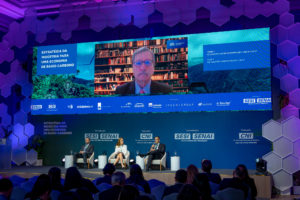São Paulo – Traditionally seen as the owners of the world’s largest oil reserves, the Arab countries are putting themselves on the map of climate change towards sustainability. So said Arab Brazilian Chamber of Commerce (ABCC) CEO & secretary-general Tamer Mansour on Wednesday (17), the second day of the meeting “Industry Strategy for a Low-Carbon Economy” held by the Brazilian National Industry Confederation (CNI) and partners in São Paulo.
The event served as a preparation for the United Nations Climate Change Conference (COP27) to take place in November in Egypt. “This shows a fresh look from the world and the decision-making countries towards the Arab states,” Mansour said about Egypt hosting one of the most important global discussions on climate in Sharm El-Sheikh.

Mansour gave some examples of the transition that is taking place in Arab cities like Dubai, commonly seen as artificial. “It’s a totally sustainable city. Most of the buildings in Dubai are now green buildings,” he said, adding that the United Arab Emirates use artificial intelligence, which was one of the tools the country used to be one of the countries that have handled the COVID-19 pandemic the best.
The ABCC’s CEO talked about the World Cup to take in Qatar later this year. Mansour said that those who have visited the country in recent months saw the sustainability changes. “From the moment you land in the airport in Qatar to the moment you leave the airport, the entire process is sustainable.” He said that electric vehicles will transport players and team staffs during the Cup.
The executive also mentioned sustainable energy projects in Morocco and the construction of the new capital city of Egypt as an example of the option for sustainability in the region. “This proves the changes in mindset in the Arab countries, with obvious differences between the countries that are able to invest more like the Gulf states, and others that receive more outside experiences and investments,” Mansour said.
The secretary-general believes that the Arab investments in sustainable projects can take place not only inside the borders of the countries but outside them as well, mainly guided by the need for food security. “And Brazil is the primary partner of the Arab countries in terms of food security,” he said, pointing out the advantages that Brazil has in the sector for its nature and wealth of industries.
Here’s more on this:
In this regard, the executive pointed out that Arab countries have some of the world’s largest investment funds. “They are increasingly looking for a sustainable industry,” Mansour said on the current focus of the Arab investments. According to the secretary-general, the Arabs want to invest in halal, healthy foods for the Arab and Muslim consumer.
On the COP27, the ABCC representative said the entity is very proud that another major event is taking place in one of the 22 Arab countries and talked about the choice of Sharm El-Sheikh. According to the executive, it is a sustainable, safe city that has welcomed many international summits. The local hotel network is comprised primarily of resorts, as the seaside city has a major tourist flow.
Private sector at COP27
Mansour talked in the panel “The Expectations of Private Sector for the COP27,” which was moderated by CNI Environment and Sustainability executive manager and featured U.S. Chamber of Commerce executive director Cássia Carvalho and Unión Industrial Argentina Environment and Sustainable Development president Claudio Terrés.
Bomtempo said that various companies present at the event have set decarbonization targets. The implementation of the emission reduction targets by countries will be discussed at COP27 in Egypt. The manager added that there is still a long way to go in the world regulation of the carbon credit market. According to him, CNI is finishing its positioning on the matter.
Carvalho spoke on behalf of the US business community. Focusing on the COP27 and climate talks, she said that the private sector plays a fundamental role: The innovation, bringing solutions for climate changes, and funding. She highlighted previous speeches in the seminar that mentioned that the world has only 50% of the technology for the adaptation necessary for climate change.
Terrés gave an overview on how Argentina is addressing the climate issue. According to him, the Unión Industrial Argentina produced a document with a long-term strategy to address the situation. He said that the participation of the private sector increased in the COP26, when global top companies were present, thus elevating their status and influence on the governments.
Translated by Guilherme Miranda




